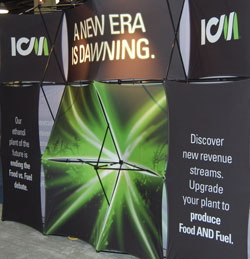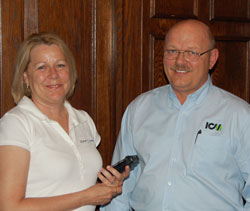 The ethanol plant of the future will produce both fuel and food with new technology from ICM, Inc.
The ethanol plant of the future will produce both fuel and food with new technology from ICM, Inc.
“ICM has been working on this technology for the last 3-5 years,” said ICM president Dave Vander Griend. “We felt that this was a good time to roll it out in light of the food and/or fuel controversy.”
Vander Griend says their technology can literally help to feed the world. “There’s been a lot of talk about the global need for grain, but in fact, the global need is really for protein,” he said.
Vander Griend says the dry fractionation component of ICM’s six-part “Food AND Fuel” (TM) technology package can be installed in existing ethanol plants as early as the fourth quarter of this year, with production coming on line by the second quarter of 2009.
 The process separates the corn kernel into its three main components – endosperm, germ and bran. Optimizing the whole kernel allows for the production of a number of food and feed grade co-products as well as another alternate fuel source to power the plant itself.
The process separates the corn kernel into its three main components – endosperm, germ and bran. Optimizing the whole kernel allows for the production of a number of food and feed grade co-products as well as another alternate fuel source to power the plant itself.
ICM installed their first “Food AND Fuel” technology package at LifeLine Foods in St. Joseph, Missouri. “They’re doing the first two steps,” said Vander Griend. “LifeLine Foods is a partnership between ICM and 700 farmers and we made that decision about two and a half years ago because this was a place where we could demonstrate all the technologies that we were working on.” They are in the process of installing the single-cell protein and the oil recovery component and they hope to have all the parts of the process commercially running at LifeLine by next summer.
Vander Griend explains the process in this interview done at the Fuel Ethanol Workshop in Nashville:
[audio:http://www.zimmcomm.biz/few08/few08-icm.mp3]
Download broadcast quality interview here:
 Dave Vander Griend Interview (15:00 min MP3)
Dave Vander Griend Interview (15:00 min MP3)
2008 Fuel Ethanol Workshop Photo Album
Thanks to the Renewable Fuels Association for helping to sponsor our coverage of FEW. More coverage of the conference is available on Good Fuels.org.

